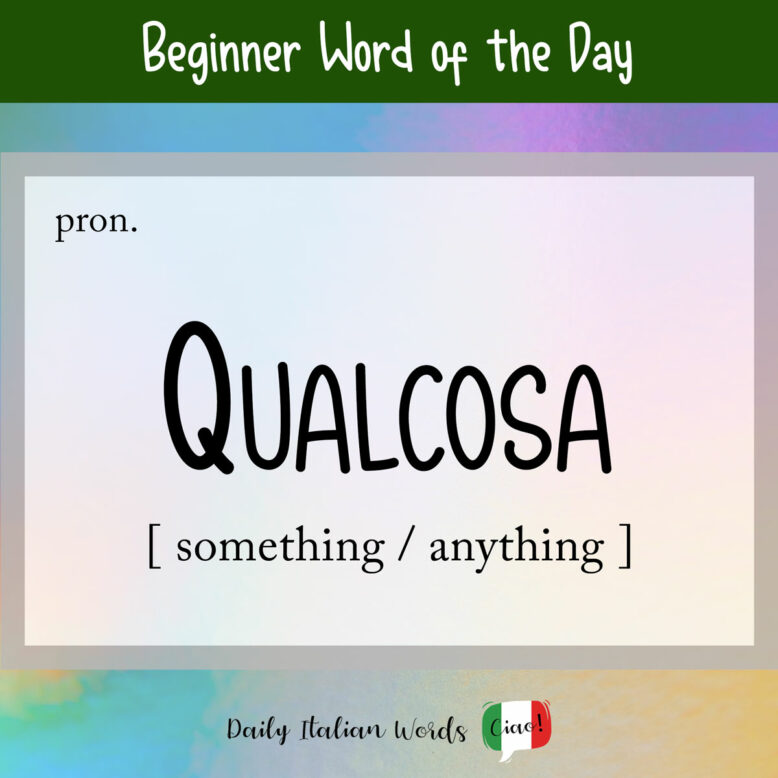Today we’re going to be investigating one of the most commonly used indefinite pronouns in Italian: qualcosa (something / anything). Derived from qualche (some) and cosa (thing), it is used to indicate one or more things that are unspecified or unknown.
qualcosa
something / anything

Qualcosa usually translates as something in English and both occur in affirmative statements. In interrogative sentences, the translation may be either something or anything. In negative statements, we must use niente (nothing) instead.
- Ho qualcosa da darti. = I have something to give you.
- Non ho niente da darti. = I have nothing / don’t have anything to give you.
- Hai qualcosa da darmi? = Do you have something / anything to give me?
- Gli ho detto qualcosa. = I said something to him.
- Non gli ho detto niente. = I said nothing / didn’t say anything to him.
- Gli hai detto qualcosa? = Did you say something / anything to him?
Vuoi fare qualcosa? – No, non voglio fare niente.
Do you want to do something? – No, I don’t want to do anything.
Qualcosa can also be followed by the preposition di and a masculine adjective (e.g. qualcosa di interessante / buono / strano = something interesting / good / strange).
C’è qualcosa di buono in frigo!
There is something good in the fridge!

The diminutive qualcosina literally means “a little something” but it is often translated as “a little bit” or “a few things”.
Hai voglia di raccontarmi qualcosina su di te?
Do you want to tell me a little bit about yourself?
When qualcosa is followed by the adjective altro (other), it is elided to qualcos’ with an apostrophe – qualcos’altro. This expression means “something else“. Alternatively you may hear qualcosa d’altro.
Non c’è la torta al cioccolato. Perché non scegli qualcos’altro?
There isn’t any chocolate cake. Why don’t you pick something else?
Qualcosa come or qualcosa tipo, on the other hand, both means something like, which in both languages is an informal way of saying “approximately” or “around“.
Ha speso qualcosa tipo €350 per il biglietto!
He spent something like €350 for the ticket!

Here are a few set expressions containing qualcosa that you’ll hear on an everyday basis in Italy.
È già qualcosa (che)
It’s something (that) / At least
Qualcosa mi dice che…
Something tells me that…
Ne so qualcosa
I’m aware of the issue
C’è qualcosa che non (mi) quadra
Something doesn’t add up
Mi dice qualcosa
It rings a bell
Qualcosa del genere
Something like that
Qualcosa can also function as a noun with the meaning of “indefinable trait” or “a certain something”. It always appears in the company of the indefinite article un (a).
C’è un qualcosa di lui che ti fa sentire molto al sicuro.
There’s a certain something about him that makes you feel very safe.
Heather Broster is a graduate with honours in linguistics from the University of Western Ontario. She is an aspiring polyglot, proficient in English and Italian, as well as Japanese, Welsh, and French to varying degrees of fluency. Originally from Toronto, Heather has resided in various countries, notably Italy for a period of six years. Her primary focus lies in the fields of language acquisition, education, and bilingual instruction.


